- Home
- Georgette Heyer
The Black Moth Page 2
The Black Moth Read online
Page 2
‘I know better! Can you, Master Jack, look me in the face and truthfully deny what I have said? Can you? Can you?’
My lord sat silent.
With a sigh, Warburton sank on to the settle once more. He was flushed, and his eyes shone, but he spoke calmly again.
‘Of course you cannot. I have never known you lie. You need not fear I shall betray you. I kept silence all these years for my lord’s sake, and I will not speak until you give me leave.’
‘Which I never shall.’
‘Master Jack, think better of it, I beg of you! Now that my lord is dead –’
‘It makes no difference.’
‘No difference? ’Twas not for his sake? ’Twas not because you knew how he loved Master Dick?’
‘No.’
‘Then ’tis Lady Lavinia –’
‘No.’
‘But –’
My lord smiled sadly.
‘Ah, Warburton! And you averred you knew us through and through! For whose sake should it be but his own?’
‘I feared it!’ The lawyer made a hopeless gesture with his hands. ‘You will not come back?’
‘No, Warburton, I will not; Dick can manage my estates. I remain on the road.’
Warburton made one last effort.
‘My lord!’ he cried despairingly. ‘Will you not at least think of the disgrace to the name an you be caught?’
The shadows vanished from my lord’s eyes.
‘Mr Warburton, I protest you are of a morbid turn of mind! Do you know, I had not thought of so unpleasant a contingency? I swear I was not born to be hanged!’
The lawyer would have said more, had not the entrance of a servant carrying a loaded tray, put an end to all private conversation. The man placed dishes upon the table, lighted candles, and arranged two chairs.
‘Dinner is served, sir,’ he said.
My lord nodded and made a slight gesture toward the windows. Instantly the man went over to them and drew the heavy curtains across.
My lord turned to Mr Warburton.
‘What say you, sir? Shall it be burgundy or claret, or do you prefer sack?’
Warburton decided in favour of claret.
‘Claret, Jim,’ ordered Carstares, and rose to his feet.
‘I trust the drive has whetted your appetite, Warburton, for honest Chadber will be monstrous hurt an you do not justice to his capons.’
‘I shall endeavour to spare his feelings,’ replied the lawyer with a twinkle, and seated himself at the table.
Whatever might be Mr Chadber’s failings, he possessed an excellent cook. Mr Warburton dined very well, beginning on a fat duck, and continuing through the many courses that constituted the meal.
When the table was cleared, the servant gone, and the port before them, he endeavoured to guide the conversation back into the previous channels. But he reckoned without my lord, and presently found himself discussing the Pretender’s late rebellion. He sat up suddenly.
‘There were rumours that you were with the Prince, sir.’
Carstares set down his glass in genuine amazement.
‘I?’
‘Indeed, yes. I do not know whence the rumour came, but it reached Wyncham. My lord said nought, but I think Mr Richard hardly credited it.’
‘I should hope not! Why should they think me turned rebel, pray?’
Mr Warburton frowned.
‘Rebel, sir?’
‘Rebel, Mr Warburton. I have served under his Majesty.’
‘The Carstares were ever Tories, Master Jack, true to their rightful king.’
‘My dear Warburton, I owe nought to the Stuart princes. I was born in King George the First’s reign, and I protest I am a good Whig.’
Warburton shook his head disapprovingly.
‘There has never been a Whig in the Wyncham family, sir.’
‘And you hope there never will be again, eh? What of Dick? Is he faithful to the Pretender?’
‘I think Mr Richard does not interest himself in politics, sir.’
Carstares raised his eyebrows, and there fell a silence.
After a minute or two Mr Warburton cleared his throat.
‘I – I suppose, sir – you have no idea of – er – discontinuing your – er – profession?’
My lord gave an irrepressible little laugh.
‘Faith, Mr Warburton, I’ve only just begun!’
‘Only – But a year ago, Mr Richard –’
‘I held him up? Aye, but to tell the truth, sir, I’ve not done much since then!’
‘Then, sir, you are not – er – notorious?’
‘Good gad, no! Notorious, forsooth! Confess, Warburton, you thought me some heroic figure? “Gentleman Harry”, perhaps?’
Warburton blushed.
‘Well, sir – I – er – wondered.’
‘I shall have to disappoint you, I perceive. I doubt Bow Street has never heard of me – and – to tell the truth – ’tis not an occupation which appeals vastly to my senses.’
‘Then why, my lord, do you continue?’
‘I must have some excuse for roaming the country,’ pleaded Jack. ‘I could not be idle.’
‘You are not – compelled to – er – rob, my lord?’
Carstares wrinkled his brow inquiringly.
‘Compelled? Ah – I take your meaning. No, Warburton, I have enough for my wants – now; time was – but that is past. I rob for amusement’s sake.’
Warburton looked steadily across at him.
‘I am surprised, my lord, that you, a Carstares, should find it – amusing.’
John was silent for a moment, and when he at length spoke it was defiantly and with a bitterness most unusual in him.
‘The world, Mr Warburton, has not treated me so kindly that I should feel any qualms of conscience. But, an it gives you any satisfaction to know it, I will tell you that my robberies are few and far between. You spoke a little while ago of my probable – ah – fate – on Tyburn Tree. I think you need not fear to hear of that.’
‘I – It gives me great satisfaction, my lord, I confess,’ stammered the lawyer, and found nothing more to say. After a long pause he again produced the bulky roll of parchment and laid it down before the Earl with the apologetic murmur of:
‘Business, my lord!’
Carstares descended from the clouds and eyed the packet with evident distaste. He proceeded to fill his and his companion’s glass very leisurely. That done, he heaved a lugubrious sigh, caught Mr Warburton’s eye, laughed in answer to its quizzical gleam, and broke the seal.
‘Since you will have it, sir – business!’
Mr Warburton stayed the night at the Chequers and travelled back to Wyncham next day by the two o’clock coach. He played piquet and écarté with my lord all the evening, and then retired to bed, not having found an opportunity to argue his mission as he had hoped to do. Whenever he had tried to turn the conversation that way he had been gently but firmly led into safer channels, and somehow had found it impossible to get back. My lord was the gayest and most charming of companions, but talk ‘business’ he would not. He regaled the lawyer with spicy anecdotes and tales of abroad, but never once allowed Mr Warburton to speak of his home or of his brother.
The lawyer retired to rest in a measure reassured by the other’s good spirits, but at the same time dispirited by his failure to induce Carstares to return to Wyncham.
Next morning, although he was not up until twelve, he was before my lord, who only appeared in time for lunch, which was served as before in the oak parlour.
He entered the room in his usual leisurely yet decided fashion and made Mr Warburton a marvellous leg. Then he bore him off to inspect his mare, Jenny, of whom he was inordinately proud. By the time they returned to the parlour luncheon was served, and Mr Wa
rburton realised that he had scarcely any time left in which to plead his cause.
My lord’s servant hovered continually about the room, waiting on them, until his master bade him go to attend to the lawyer’s valise. When the door had closed on his retreating form, Carstares leaned back in his chair, and, with a rather dreary little smile, turned to his companion.
‘You want to reason with me, I know, Mr Warburton, and, indeed, I will listen an I must. But I would so much rather that you left the subject alone, believe me.’
Warburton sensed the finality in his voice, and wisely threw away his last chance.
‘I understand ’tis painful, my lord, and I will say no more. Only remember – and think on it, I beg!’
The concern in his face touched my lord.
‘You are too good to me, Mr Warburton, I vow. I can only say that I appreciate your kindness – and your forbearance. And I trust that you will forgive my seeming churlishness and believe that I am indeed grateful to you.’
‘I wish I might do more for you, Master Jack!’ stammered Warburton, made miserable by the wistful note in his favourite’s voice. There was no time for more; the coach already awaited him, and his valise had been hoisted up. As they stood together in the porch, he could only grip my lord’s hand tightly and say good-bye. Then he got hurriedly into the coach, and the door was slammed behind him.
My lord made his leg, and watched the heavy vehicle move forward and roll away down the street. Then with a stifled sigh he turned and walked towards the stables. His servant saw him coming and went at once to meet him.
‘The mare, sir?’
‘As you say, Jim – the mare. In an hour.’
He turned and would have strolled back.
‘Sir – your honour!’
He paused, looking over his shoulder.
‘Well?’
‘They’re on the look-out, sir. Best be careful.’
‘They always are, Jim. But thanks.’
‘Ye – ye wouldn’t take me with ye, sir?’ pleadingly.
‘Take you? Faith, no! I’ve no mind to lead you into danger. And you serve me best by remaining to carry out my orders.’
The man fell back.
‘Ay, sir; but – but –’
‘There are none, Jim.’
‘No, sir – but ye will have a care?’
‘I will be the most cautious of men.’ He walked away on the word, and passed into the house.
In an hour he was a very different being. Gone was the emerald ring, the foppish cane; the languid air, too, had disappeared, leaving him brisk and businesslike. He was dressed for riding, with buff coat and buckskin breeches, and shining top boots. A sober brown wig replaced the powdered creation, and a black tricorne was set rakishly atop.
He stood in the deserted porch, watching Jim strap his baggage to the saddle, occasionally giving a curt direction. Presently Mr Chadber appeared with the stirrup-cup, which he drained and handed back with a word of thanks and a guinea at the bottom.
Someone called lustily from within, and the landlord, bowing very low, murmured apologies and vanished.
Jim cast a glance at the saddle-girths, and, leaving the mare quietly standing in the road, came up to his master with gloves and whip.
Carstares took them silently and fell to tapping his boot, his eyes thoughtfully on the man’s face.
‘You will hire a coach, as usual,’ he said at length, ‘and take my baggage to –’ (He paused, frowning) – ‘Lewes. You will engage a room at the White Hart and order dinner. I shall wear – apricot and – h’m!’
‘Blue, sir?’ ventured Jim, with an idea of being helpful.
His master’s eyes crinkled at the corners.
‘You are a humorist, Salter. Apricot and cream. Cream? Yes, ’tis a pleasing thought – cream. That is all – Jenny!’
The mare turned her head, whinnying as he came towards her.
‘Good lass!’ He mounted lightly and patted her glossy neck. Then he leaned sideways in the saddle to speak again to Salter, who stood beside him, one hand on the briddle.
‘The cloak?’
‘Behind you, sir.’
‘My wig?’
‘Yes, sir.’
‘Pistols?’
‘Ready primed, sir.’
‘Good. I shall be in Lewes in time for dinner – with luck.’
‘Yes, sir. Ye – ye will have a care?’ anxiously.
‘Have I not told you?’ He straightened in the saddle, touched the mare with his heel, and bestowing a quick smile and a nod on his man, trotted easily away.
Two
My Lord at the White Hart
Sir Anthony Ferndale sat before the dressing-table in his room at the White Hart, idly polishing his nails. A gorgeous silk dressing gown lay over the back of his chair, and, behind him, Jim was attending to his wig, at the same time hovering anxiously over the coat and waistcoat that were waiting to be donned.
Carstares left off polishing his nails, yawned, and leaned back in his chair, a slim graceful figure in cambric shirt and apricot satin breeches. He studied his cravat for some moments in the mirror, and lifted a hand to it. Salter held his breath. With extreme deliberation the hand moved a diamond and emerald pin the fraction of an inch to one side, and fell to his side again. Salter drew a relieved breath, which brought his master’s eyes round to himself.
‘No trouble, Jim?’
‘None at all, sir.’
‘Neither had I. ’Twas most surprisingly easy. The birds had no more fight in them than sparrows. Two men in a coach – one a bullying rascal of a merchant, the other his clerk. Gad! but I was sorry for that little man!’ He paused, his hand on the rouge pot.
Salter looked an inquiry.
‘Yes,’ nodded Carstares. ‘Very sorry. The fat man would appear to bully and browbeat him after the manner of his kind; he even blamed him for my advent, the greasy coward! Yes, Jim, you are right – he did not appeal to me, ce M. Fudby. So –’ ingenuously, ‘I relieved him of his cash-box and two hundred guineas. A present for the poor of Lewes.’
Jim jerked his shoulder, frowning.
‘If ye give away all ye get, sir, why do ye rob at all?’ he asked bluntly.
His whimsical little smile played about my lord’s mouth.
‘’Tis an object for my life, Jim; a noble object. And I believe it amuses me to play Robin Hood – take from the rich to give to the poor,’ he added, for Salter’s benefit. ‘But to return to my victims – you would have laughed had you but seen my little man come tumbling out of the coach when I opened the door!’
‘Tumble, sir? Why should he do that?’
‘He was at pains to explain the reason. It seems he had been commanded to hold the door to prevent my entering – so when I jerked it open, sooner than loose his hold, he fell out on to the road. Of course, I apologised most abjectly – and we had some conversation. Quite a nice little man… It made me laugh to see him sprawling on the road, though!’
‘Wish I could have seen it, your honour. I would ha’ liked fine to ha’ been beside ye.’ He looked down at the lithe form with some pride. ‘I’d give something to see ye hold up a coach, sir!’
Haresfoot in hand, Jack met his admiring eyes in the glass, and laughed.
‘I make no doubt you would… I have cultivated a superb voice, a trifle thick and beery, a little loud, perhaps – ah, something to dream of o’ nights! I doubt they do, too,’ he added reflectively, and affixed the patch at the corner of his mouth.
‘So? A little low, you think? But ’twill suffice – What’s toward?’
Down below in the street there was a great stirring and bustling: horses’ hoofs, shouts from the ostlers, and the sound of wheels on the cobble-stones. Jim went to the window and looked down, craning his neck to see over the balcony.
‘’T
is a coach arrived, sir.’
‘That much had I gathered,’ replied my lord, busy with the powder.
‘Yes, sir. O lord, sir!’ He was shaken with laughter.
‘What now?’
‘’Tis the curiosest sight, sir! Two gentlemen, one fat and t’other small! One’s all shrivelled-looking, like a spider, while t’other –’
‘Resembles a hippopotamus – particularly in the face?’
‘Well yes, sir. He do rather. And he be wearing purple.’
‘Heavens, yes! Purple, and an orange waistcoat!’
Jim peered afresh.
‘So it is, sir! But how did you know?’ Even as he put the question, understanding flashed into Jim’s eyes.
‘I rather think that I have had the honour of meeting these gentlemen,’ replied my lord placidly. ‘My buckle, Jim… Is’t a prodigious great coach with wheels picked out in yellow?’
‘Ay, your honour. The gentlemen seem a bit put out, too.’
‘That is quite probable. Does the smaller gentleman wear somewhat – ah – muddied garments?’
‘I can’t see, sir, he stands behind the fat gentleman.’
‘Mr Bumble Bee… Jim!’
‘Sir!’ Jim turned quickly at the sound of the sharp voice.
He found that my lord had risen, and was holding up a waistcoat of pea-green pattern on a bilious yellow ground, between a disgusted finger and thumb. Before his severe frown Jim dropped his eyes and stood looking for all the world like a schoolboy detected in some crime.
‘You put this – this monstrosity – out for me to wear?’ in awful tones.
Jim eyed the waistcoat gloomily and nodded.
‘Yes, sir.’
‘Did I not specify cream ground?’
‘Yes, sir. I thought – I thought that ’twas cream!’
‘My good friend, it is – it is – I cannot say what it is. And pea-green!’ he shuddered. ‘Remove it.’
Jim hurried forward and disposed of the offending garment.
‘And bring me the broidered satin. Yes, that is it. It is particularly pleasing to the eye.’
‘Yes, sir,’ agreed the abashed Jim.
‘You are excused this time,’ added my lord, with a twinkle in his eye. ‘What are our two friends doing?’

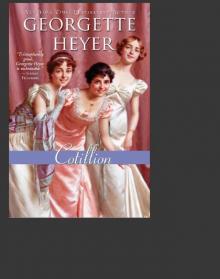 Cotillion
Cotillion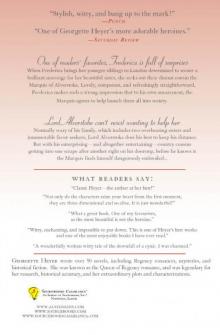 Frederica
Frederica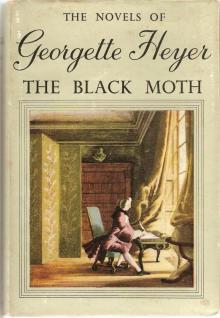 The Black Moth: A Romance of the XVIIIth Century
The Black Moth: A Romance of the XVIIIth Century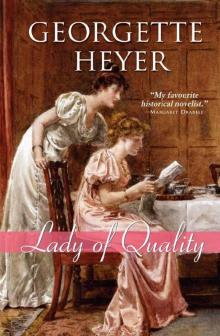 Lady of Quality
Lady of Quality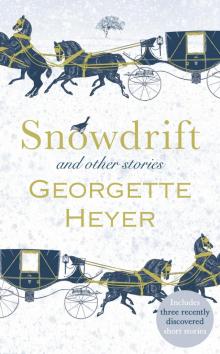 Snowdrift and Other Stories
Snowdrift and Other Stories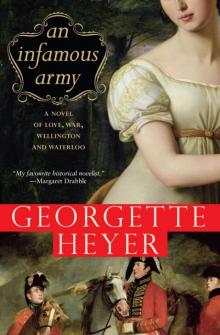 An Infamous Army
An Infamous Army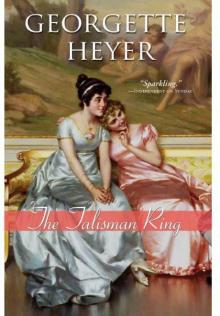 The Talisman Ring
The Talisman Ring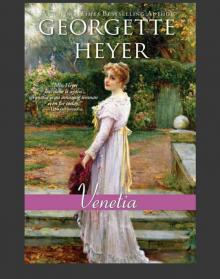 Venetia
Venetia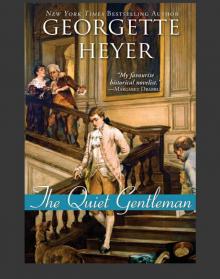 The Quiet Gentleman
The Quiet Gentleman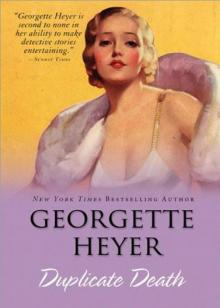 Duplicate Death
Duplicate Death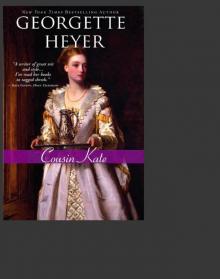 Cousin Kate
Cousin Kate Black Sheep
Black Sheep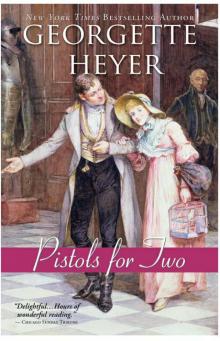 Pistols for Two
Pistols for Two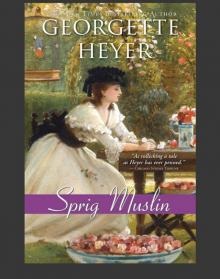 Sprig Muslin
Sprig Muslin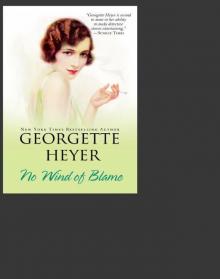 No Wind of Blame
No Wind of Blame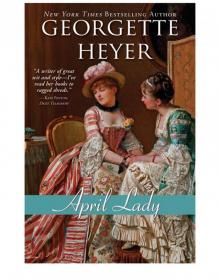 April Lady
April Lady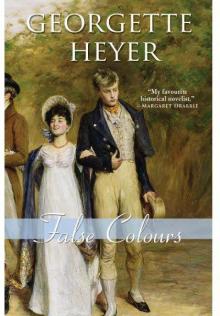 False Colours
False Colours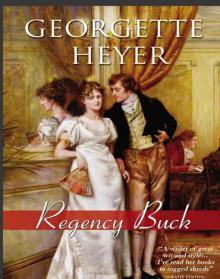 Regency Buck
Regency Buck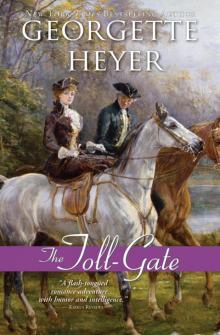 The Toll-Gate
The Toll-Gate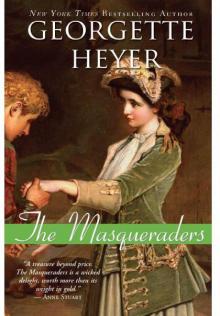 The Masqueraders
The Masqueraders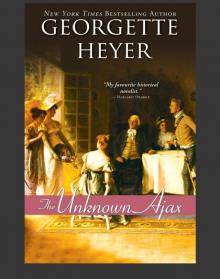 The Unknown Ajax
The Unknown Ajax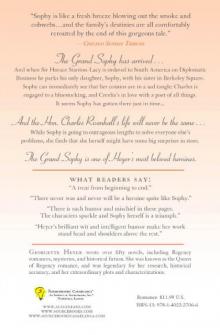 The Grand Sophy
The Grand Sophy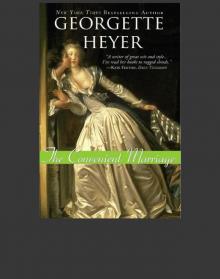 The Convenient Marriage
The Convenient Marriage Faro's Daughter
Faro's Daughter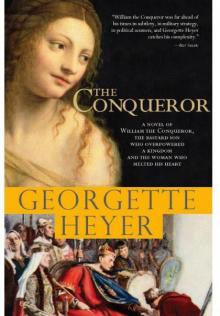 The Conqueror
The Conqueror The Foundling
The Foundling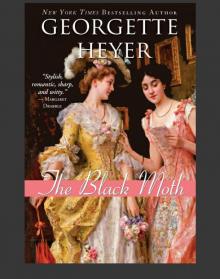 The Black Moth
The Black Moth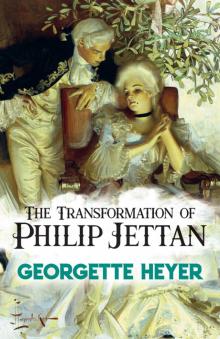 The Transformation of Philip Jettan
The Transformation of Philip Jettan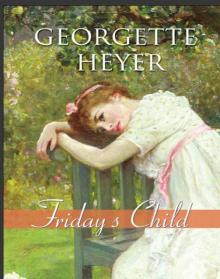 Friday's Child
Friday's Child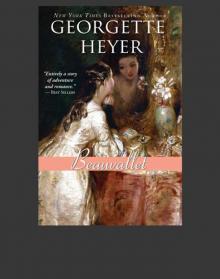 Beauvallet
Beauvallet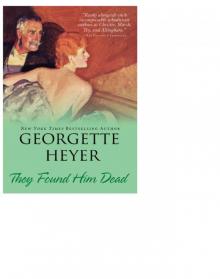 They Found Him Dead
They Found Him Dead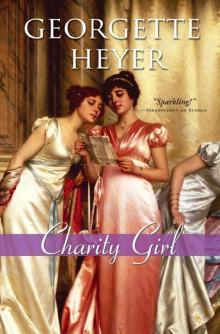 Charity Girl
Charity Girl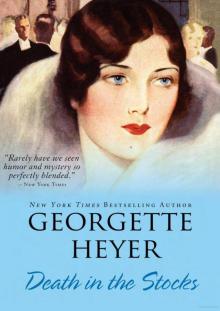 Death in the Stocks: Merely Murder
Death in the Stocks: Merely Murder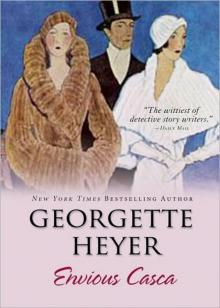 Envious Casca
Envious Casca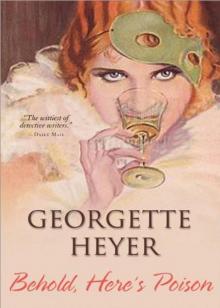 Behold, Here's Poison
Behold, Here's Poison Arabella
Arabella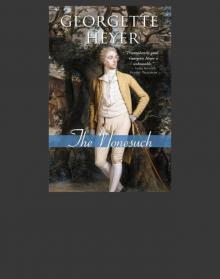 The Nonesuch
The Nonesuch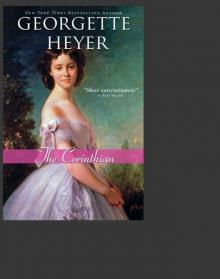 The Corinthian
The Corinthian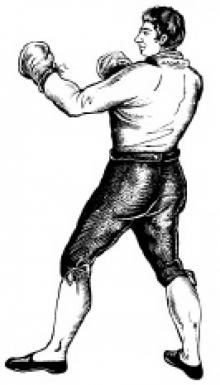 Jennifer Kloester
Jennifer Kloester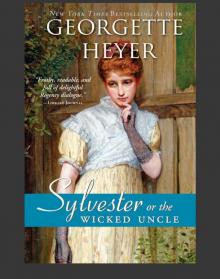 Sylvester
Sylvester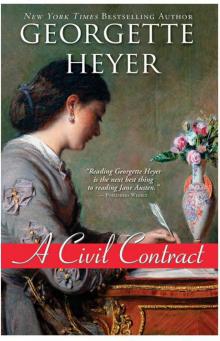 A Civil Contract
A Civil Contract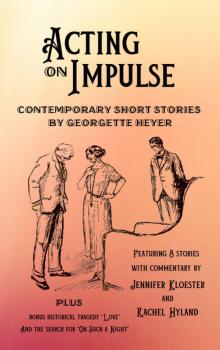 Acting on Impulse
Acting on Impulse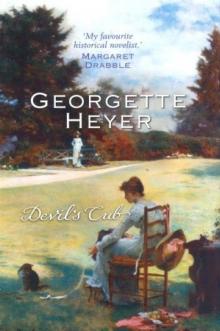 Devil’s Cub at-2
Devil’s Cub at-2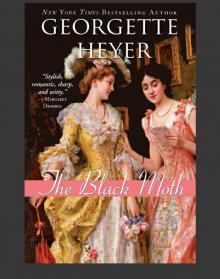 Black Moth
Black Moth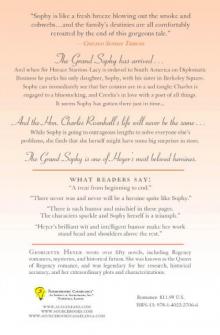 Grand Sophy
Grand Sophy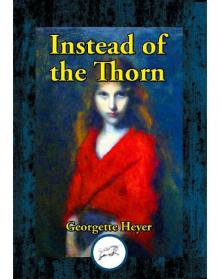 Instead of the Thorn
Instead of the Thorn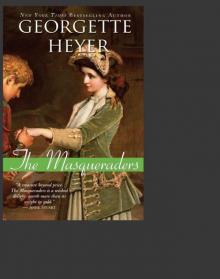 Masqueraders
Masqueraders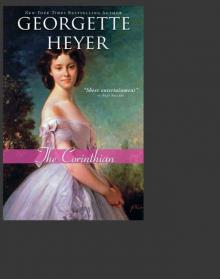 Corinthian
Corinthian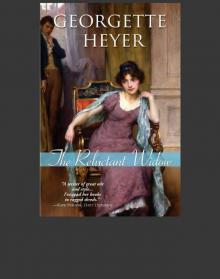 Reluctant Widow
Reluctant Widow